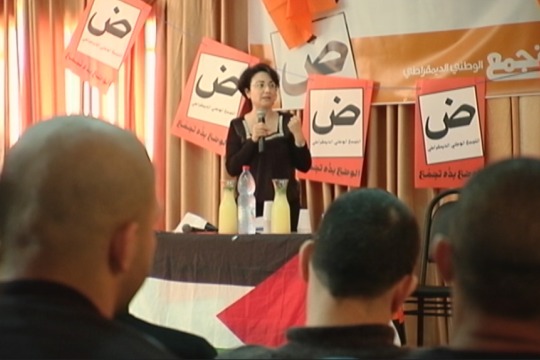The new legislation will benefit medium-sized parties like the settlers’ Jewish Home and Yair Lapid’s Yesh Atid, while increasing the influence of big money on politics.
The Knesset approved today (Tuesday) several changes in its elections and governance laws. Among other things, the changes will make it more difficult to challenge the government in a vote of non-confidence, and set the threshold for entering the Knesset at 3.25 percent, or roughly four Knesset seats.
The legislation is a joint initiative by Yair Lapid’s Yesh Atid party and Avigdor Liberman’s Israel Beitenu (which united with Netanyahu’s Likud party prior to the last elections). The final vote in the Knesset passed by a 67-0 majority, with the entire opposition boycotting the vote to protest the coalition’s implementation of special procedural measures earlier this week.
The new law will mostly affect the three Palestinian parties, which usually win between 3-4 seats each. Hadash, the joint Arab-Jewish party, currently has four seats; the same goes for the United Arab List (a unification of three parties, including the Islamic Ta’al party). The secular Balad party, which currently has three seats, would not have made it into the Knesset under the new law. Prior to the last elections, Knesset members banned Balad MK Hanin Zoabi from participating in the elections, a decision that was later overruled by the Supreme Court.
Kadima, an opposition party that has two seats in the current Knesset, would not have not made it in as well under the new legislation.

The law might benefit medium-size parties like Yair Lapid’s Yesh Atid, Shas and the settlers’ Jewish Home party, since they will not stand the risk of losing supporters to fringe parties, especially now that voters know that those factions are not likely to enter the Knesset. In the last elections, the settlers lost two seats because of an unsuccessful run by the far-right Otzma Le’Yisrael party, while Shas took a hit due to attempts by Rabbi Amsalem and Rabbi Amnon Yitzhak to run on their own.
The new legislation is also likely to increase the influence of the financial elite and the mainstream media on the political system, as it will make it harder for smaller parties to launch guerrilla campaigns or win seats in the Knesset. This will happen because more resources will be required to run a successful political campaign.
Supporters of the law claim that it will diminish the disproportional bargaining power of small factions while strengthening the government’s ability to execute its policies. However, a closer examination of the political history shows that 2-4 person factions do not enjoy such powers at all, and that Palestinian parties, which will be hurt most by the change, have never been made part of the coalition, nor do have they ever received any special benefits (quite the opposite is true, in fact).
The ultra-Orthodox parties, which are often accused of “extorting” benefits in return for political support, have won four seats or more in every election since 1996. In fact, Shas has never won fewer than four seats.
The current legislation disproves the claim that the government’s ability to execute is or has ever truly been at risk. Whenever an Israeli government was united behind a certain piece of legislation or policy initiative – war, settlements construction or evacuation – it had no problem pushing it forward.

The Palestinian parties will now need to either unite or risk losing their place in the Knesset. In recent months, Arab MKs have expressed rage over the attempts to force a union on them, pointing to the fact that the communists of Hadash, the seculars of Balad and the Islamic members of the Knesset have very little in common – save for being Palestinian. Many in the Arab public feel that those who suggest the parties unite are perpetuating the Jewish public’s tendency to view the Palestinian minority as one single monolith – deprived of the complexity and political competition that Jews see in themselves.
However, due to both the low voter turnout among Palestinians and Israel’s electoral arithmetic, a joint list might actually increase Palestinian representation in the Knesset.
Two more pieces of controversial laws are bound to pass this week: a national military service reform, which will impose draft quotas on the ultra-Orthodox community (which is currently exempt from service), and the referendum law, which states that any evacuation of Israeli territory must first be approved by a national referendum, making a territorial compromise in Jerusalem and its surrounding areas harder to achieve. The referendum law does not apply to the rest of the West Bank, which was never annexed by Israel.
Related:
Knesset approves bill that could push Arab parties out
Zoabi: Voting in Israeli elections is part of the struggle
Why Palestinian citizens don’t vote in Israeli elections

